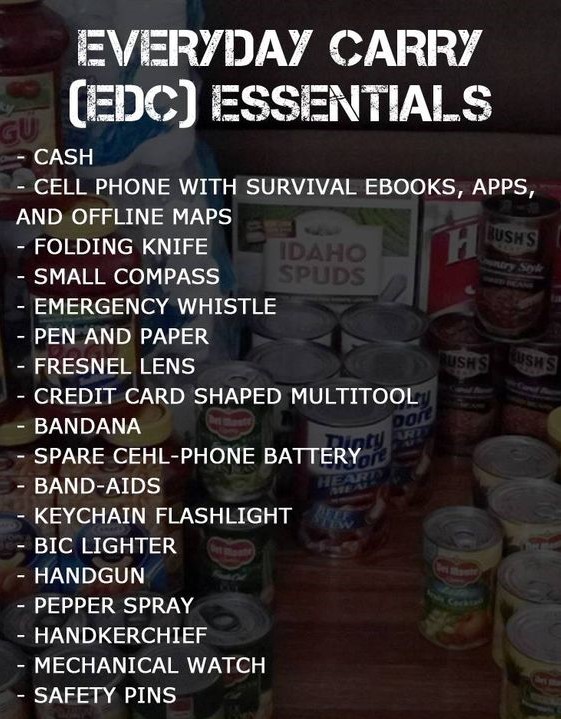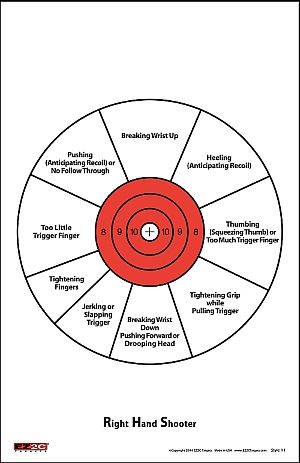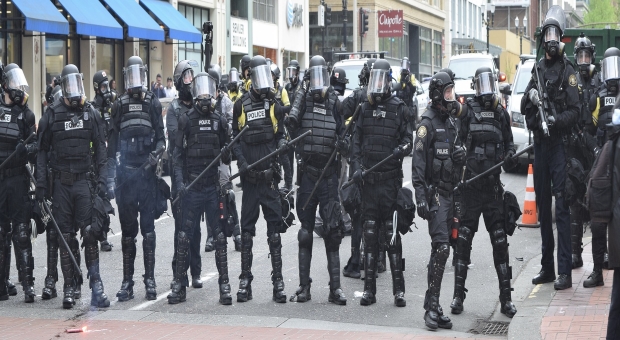Urban preppers have to deal with a lot more prepping and survival problems than those living in small communities.
Limited space is one of the issues they have to cover, but that is nothing compared to the troubles the population density may bring. In a densely populated area, even your neighbors are hard to trust, and you can never know who might be a friend or foe when SHTF.
The tips from this article should give urban preppers the upper hand when it all goes south, and it will increase their chances of survival.
As an urban prepper, the number one thing you need to do is to acknowledge that living in an urban environment is not ideal if a crisis arises. Surviving in an urban setting is difficult because there are many factors to be considered. It requires much more work and preparation to just be able and face a disaster, let alone survive it.
You need a watchful eye, and as a training strategy, you should be on constant alert. Some people will decide that bugging in and trying to outlast the others will be their only choice. Others will try to evacuate and reach a safe retreat. This all depends on a variety of factors, and only you should make a decision based on your preparation plans and survival strategy.
If you decide to stay in the city, here are a few tips you should put to good use when the time comes.
Survival strategies in an urban environment
1. Tune in and listen!
In general, before something occurs, there always some tell-tale signs and information reaching the masses. This is the type of information you need to discover and gather before it’s too late. Having a police scanner and learning how to use it brings a major advantage to an urban prepper. This tool is even more valuable if evacuation is your main choice for survival. A police scanner will tell you where the disaster has occurred, if it’s spreading and what measures are being put in place to address social implications (evacuation, riots, etc.).
Another method to listen to the outside world is by HAM radio, and in certain cases, it may be more useful than a police scanner. HAM operators will report from the scene or its vicinity without filtering information. You will know exactly what is going on and you will get much more accurate details.
2. Learn to jump-start a car
If you need to bug out and leave the city behind, you may encounter roadblocks or other obstacles that may force you to abandon your vehicle of choice. Knowing how to jump-start a car in such cases is a vital skill. Running or walking is not a good option in an urban environment unless you know all the safest routes, and you are well-trained for such physical activity.
Breaking into a car and jumpstarting it, may, in fact, be your only option to acquire a new bug-out vehicle to get out of the city. However, before using this tactic as your last resort , there are a few things to consider.
First, make sure your vehicle is well-maintained and has a full gas tank. Second, learn how to deal with simple problems and have a basic understanding of general car maintenance. And third, if you’re not sure about stealing someone’s car, always have a secondary method of transportation. A good bicycle is an ideal option for an urban setting.
3. Keep your bug-out bag close
City dwellers know that time is of the essence during “quiet” days, when competing in the rat race. You always have to make sure you’re not late for appointments, chores, and everything else. Imagine how critical time becomes for an urban prepper when a disaster hits. You will be under constant pressure, and the last thing you want to do is to search for your survival bag and other gear.
All the stuff that would make evacuation easier should always be in reach. Some urban preppers have two bug-out bags, one in their car and one at home. The logic behind this is that you may not be able to reach your home and the next best thing you can do is either go to the establish meeting point or go to retrieve your loved ones. Having a spare bug-out bag will increase your chances of making it out without having to improvise every step of the way.
4. Build an emergency plan for your family
Having a family emergency plan is mandatory regardless if you decide to bug-out or hunker down. The plan should cover as many aspects as possible of the disaster(s) you are planning for, and every family member should have a role in it. Here is what a basic emergency plan should cover depending on the choices you have:
 Bugging out
Bugging out
- Have a bug-out-bag ready and in reach
- Make arrangements to turn utilities off before leaving the house
- Learn every possible escape route and inform your family about them
- Keep a BOV well-maintained and ready to go
- Establish meeting points for each escape route
- Have communication means for everyone
- Assure protection for every family member
- Plan for a bug out location or a safe retreat
Bugging in
- Secure water at the last minute before municipal utilities stop working (fill your bathtub and any available container with tap water)
- Cut off utilities that may pose a problem (especially the gas line)
- Tune in and listen to what’s going on outside your fort. The sudden development of the crisis may force you to evacuate.
- Have enough supplies to last for at least 3months and plan for a solution afterward.
- Implement any means you have for heating and generating electricity
- Have a complete first-aid kit designed for various types of emergencies
- Make sure your home is protected against forced entries
Of course, that emergency plans cover much more than this, but each plan should be made based on factors such as location, family members count, resources, knowledge, and skills. As urban preppers, you should at least have what’s listed above to have a fighting chance.
5. Learn to make your own food
City folks have no time nor will for cooking, and ordering food or going out to eat is the main course of action. However, if you plan to survive for times when the foodservice industry will be dead, you need to learn how to cook. I’m not talking here about taking a gourmet cooking class. Far from that! I’m just suggesting you should know how to cook a meal with the resources you have in your pantry and how to turn food scraps into a tasty meal.
Also, you could produce some food to supplement your needs by trying container gardening. Many urban dwellers are doing it nowadays as a relaxing hobby. For you, it can become an activity that provides nourishment during a time of need, but also a project to keep you sane when SHTF.
Think of it like this, if you manage to outlast the majority of your fellow peers, the lack of food will become a serious problem as time goes by. Your main choices would be to grow your own or scavenge for it.
6. Discover the city and know its advantages
Most city folks, don’t know their city as well as they should although , even though it should be common sense if you think about it. They are all connected to their phones, and the younger generation has stopped looking out the window a long time ago. They go by every day without noticing things that someday might prove useful for their survival.
If you live in the city and if you are serious about emergency preparedness, you should give yourself time to explore the city and find your way around it. Learn the major roads and intersection, the back alleys, and how to get from point A to point B without using the main roads. You shouldn’t rely on your phone for navigation because that might not be an option when SHTF.
Knowing your environment is critical for every survival situation. You don’t want to get lost in the city or be unable to reach your family in case of a disaster.
7. Powering your home is a dangerous process
Cooking and heating will be two of the major problems for any urban prepper if utilities are shut down. You will have to struggle and improvise since gathering firewood and cooking over a campfire is not really an option for you.
Some urban preppers will go with slow and low burning fuel sources. However, you will run out of fuel eventually, and you will either have to scavenge for fuel or find other ways for cooking and heating. As an urban prepper, you need to find ways to be able to cook and heat your home without attracting unnecessary attention.
If you have to hunker down for a long period of time, try getting a solar cooker and heating sources that don’t make noise or bright light. You can look online and investigate the fuel source available, portable power generators, etc.
8. Think about your water needs
Storing water becomes a big problem for urban preppers due to its bulky and heavy nature. You have limited space, and you need to make the best use of it. Filling your apartment with water containers may not be ideal.
The first thing you must do when disaster strike is to fill your bathtub or any available container in your home with tap water. By doing so, you will not use your stored water supplies, and you will have a good start before you have to face dehydration or any other problem.
One safe bet you can count on are the portable water filters and your ability to improvise rain catcher that could be attached outside your windows or to be installed on the roof of your building. Another option, especially for an urban prepper, is to procure a device that makes water out of the air, as it will be very useful when your water supplies are running low.
 9. Guns and ammunition
9. Guns and ammunition
As an urban prepper, once he or she decides to hunker down, there will be the need for at least two firearms and the appropriate ammo for them. There is a big debate on the internet when it comes to how much guns and ammo you should store for facing an emergency situation. Personally, I think that you need a firearm for every family member that is able to use one and has a good practice with it.
As for ammo, I think that 1000 rounds are more than enough for urban preppers. Hopefully, you won’t be using that many when SHTF. Since you won’t be able to go hunting, it’s no use spending all your money on guns and ammo. Invest wisely and use your money for other resources and items to keep your fort running.
10. Self-care requirements
This is a big problem for all preppers, not only for the urban ones. People say that the world is full of doctors and lawyers. However, during a crisis, you will find out that doctors will not be available since they have others to care for (especially their friends and family). You may hunker down for a long time and attend to all your culinary and comfort needs, but what happens if you get ill or injured?
Your one and only solution would be to learn about self-care and self-healing. Take as many first aid classes as possible and consider attending an EMT course. In an urban environment, you are prone to more injuries than in rural environments. Anything from debris, projectiles or sharp objects can leave a nasty mark during a disaster.
It is vital to learn how to disinfect and treat a wound and how to make the best use of your first-aid kit. Learn about sanitation and disinfection techniques since these are critical when medical aid is not available, and you have to stop bacteria and disease from spreading. Having good first aid knowledge and stockpiling on medicine will prove useful, regardless of the nature of the disaster you are preparing for.
A last word
The life of an urban prepper is complicated, and they have to struggle much more than the rest of us. For some, bugging out will be their only chance of survival, while for others, it may not work so well. Urban survival becomes difficult because there are many unknown and unpredictable factors caused by the human element. The population density can greatly increase the risks associated with a disaster (even minor ones), and you could be caught in the middle of it.
Learn how to hold down your fort, but most importantly be mentally prepared to leave everything behind if the situation calls for it. Have everything you need in reach to make the journey and don’t look back once you’re out the door.























































































You’ve got me thinking/rethinking!! I need to retry solar cooking as the last attempt was a bust. Needs to be a cooker we can build ourselves and will work in Toledo, Ohio climate .. .
Any suggestions?
Hello, Karen. Some thoughts for you . . . Do Not even worry about anything solar, We live where there is over 300 sunny days a year, and I for one am Not About To depend on anything Solar – Either Cooking, Boiling, or photo-voltaic electric power ! For cooking you are better off with a small, portable “Rocket” stove – mine is 12″ X 12″ X 12″ high. It will burn anything (make the fuel small in size) and as long as you have a small folding stove-top oven, a small cast iron “Dutch Oven” (Round with a tight lid) , a 10″ C/I Griddle, and a 10″ C/I skillet ( with lid is good idea) – you can cook just about Anything – Anywhere ! I am very serious about this. Best of Luck to You. Bill
I live in an apt tower, tower being over 3 floors so when the grid goes down we have no water pressure and its a very long walk to ground level. I had a neighbour assist me with something, and now he knows we have water, food, and other things stockpiled for when SHTF.
I just know he will be knocking on my door when his half-weeks worth of groceries is gone.
How to you get to make water out of the air ? Where do I get the directions to buy or make a product that makes water out of air?
Thank you !
100 rounds of ammo? Did you mean 100 round in your BOB? Please have more than that at your Alamo. 100 rounds is 3 magazines and will be gone in minutes if you really need it. The standard combat load for .a US soldier is 7X30 round magazines minimum, thats a little over 200 rounds Thats for a single mission or patrol. If you are defending your homestead or your fily you certainly need much more.
The groups I am involved with, we recomened a minimum of 1000 rounds per weapon. So 2 ARs and a couple of 9mm pistols. Yep thats 4000 rounds stored safe and dry. Not a hard thing to do either. God luck and god bless.
Karen.
Without knowing your current level of preparedness I would encourage you to not dismiss anything that will help you cook or bake.
Solar ovens work just fine here in northwest Montana.Sure there are cold and days ,but there are so many things you can do with the solar oven on sunny days.I feel that the commercial models are very high quality,but there are a lot of home made plans on the internet.
By “Jumpstart,” I assume you mean hotwire? Cars since 2000 or so are near impossible for the layperson to hotwire quickly (as in a bugout scenario).